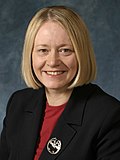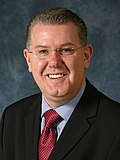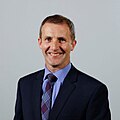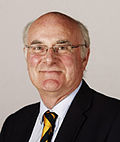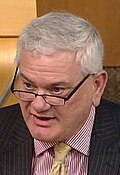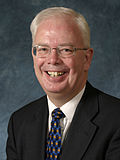| 2nd Scottish Parliament | |||||
|---|---|---|---|---|---|
| |||||
 The Scottish Parliament Building opened during this term | |||||
| Overview | |||||
| Legislative body | Scottish Parliament | ||||
| Jurisdiction | Scotland | ||||
| Meeting place | General Assembly Scottish Parliament Building | ||||
| Term | 7 May 2003 – 2 April 2007 | ||||
| Election | 2003 | ||||
| Government | Second McConnell government | ||||
| Members | 129 | ||||
| Presiding Officer | George Reid | ||||
| First Minister | Jack McConnell | ||||
| Deputy First Minister | Jim Wallace (2003–05) Nicol Stephen (2005–07) | ||||
| Leader of the largest opposition party | John Swinney (2003–04) Nicola Sturgeon (2004–07) | ||||
| This article is part of a series within the Politics of the United Kingdom on the |
| Politics of Scotland |
|---|
 |
This is a list of members (MSPs) returned to the second Scottish Parliament at the 2003 Scottish Parliament election. Of the 129 members, 73 were elected from first past the post constituencies with a further 56 members being returned from eight regions, each electing seven MSPs as a form of mixed member proportional representation.
Contents
- Composition
- Graphical representation
- List of MSPs
- Former MSPs
- Changes
- See also
- References
- External links
The 2nd Scottish Parliament produced a second hung parliament and became colloquially known as the Rainbow Parliament. This was due to the 2003 election producing a result whereby the incoming members represented the largest number of political parties, with wide-ranging views from across the political spectrum, to be elected at a national level in Scotland. The governing Labour – Liberal Democrat coalition continued in government for a second term. [1]


































